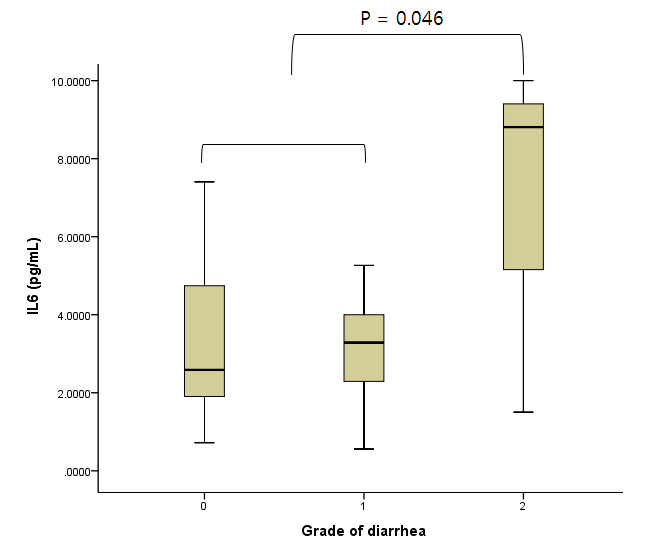글로벌 연구동향
방사선종양학
- [Clin Transl Radiat Oncol.] The association between diarrhea and serum cytokines in patients with gynecologic cancer treated with surgery and pelvic chemoradiotherapy
분당서울대병원 / 엄근용*
- 출처
- Clin Transl Radiat Oncol.
- 등재일
- 2021 Jun 9
- 저널이슈번호
- 29:60-64. doi: 10.1016/j.ctro.2021.05.010. eCollection 2021 Jul.
- 내용
Abstract
Purpose: We investigated whether serum cytokines including Interleukin (IL)-1β, IL-6 and tumor necrosis factor alpha (TNFα) are increased during pelvic chemoradiotherapy (CRT) in patients with gynecologic malignancies, and sought to identify prognostic factors for the development of diarrhea during pelvic CRT.Materials and methods: Patients with cervical or endometrial cancer receiving postoperative pelvic CRT were eligible for this prospective study. Patients were evaluated weekly during CRT for symptoms, including diarrhea and constipation. Serum cytokine levels were measured using immunoassays 1 week before CRT, and at week 3 and 5-6 during CRT. Radiotherapy-related parameters such as mean dose, minimum dose, and maximum dose to the small bowel were also analyzed. Multivariate logistic regression analysis was used to assess factors associated with development of enteritis symptoms.
Results: Twenty-six patients were enrolled, all of whom were eligible for symptom and dosimetric parameter evaluation; 24 were eligible for cytokine level measurement. Cytokine levels did not differ between patients with and without diarrhea before CRT. IL-6 levels increased during CRT, and were significantly higher in patients with diarrhea ≥grade 2 than in those with grade 0-1 at week 5-6 (6.771 ± 2.657 pg/mL vs. 3.396 ± 0.499 pg/mL, p = 0.046). Serum IL-1β and TNFα levels did not change during CRT. Diarrhea before CRT and the maximum dose to the small bowel were independent prognostic factors for CRT-induced diarrhea in the multivariate analysis.
Conclusions: There was an increase of serum IL-6 levels in patients with ≥grade 2 diarrhea during pelvic CRT. Serum IL-1β and TNFα levels did not change during CRT. Radiotherapy-related and clinical factors affect the development of diarrhea during pelvic CRT.

Affiliations
Keun-Yong Eom 1 , Chan Woo Wee 1 , Changhoon Song 1 , In Ah Kim 1 , Jae-Sung Kim 1 , Kidong Kim 2 , Dong Hoon Suh 2 , Jae Hong No 2 , Yong Beom Kim 2 , Jeong Su Park 3
1 Department of Radiation Oncology, Seoul National University Bundang Hospital, Seongnam, Republic of Korea.
2 Department of Obstetrics and Gynecology, Seoul National University Bundang Hospital, Seongnam, Republic of Korea.
3 Department of Laboratory Medicine, Seoul National University Bundang Hospital, Seongnam, Republic of Korea.
- 키워드
- Acute enteritis; Chemoradiotherapy; Cytokine; Diarrhea; Gynecologic cancer.
- 연구소개
- 부인암(자궁경부암, 자궁내막암) 환자에서 수술 후 골반 항암화학방사선치료를 받는 경우에 흔히 생기는 부작용인 설사 및 변비와 혈중 사이토카인 농도의 상관관계를 분석한 논문입니다. 방사선치료 5-6주에 설사의 정도와 혈중 IL-6 농도가 상관관계가 있을 것을 확인할 수 있었습니다.
- 덧글달기
- 이전글 [Int J Cancer.] Hypofractionated volumetric-modulated arc therapy for breast cancer: A propensity-score-weighted comparison of radiation-related toxicity
- 다음글 [Cancers (Basel).] Is the Concurrent Use of Sorafenib and External Radiotherapy Feasible for Advanced Hepatocellular Carcinoma? A Meta-Analysis









